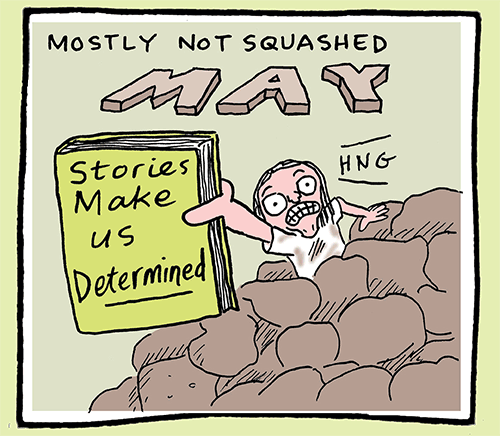
Mostly-Not-Squashed May:
Stories Make Us Determined

Welcome to Mostly Not Squashed May. If you’re reading this on public transport you might disagree with me, and I’d understand that because I’m writing this on a bus, or as the elbow of the person jammed next to me helped me put it, on a boss. Which might well be true because the person I’m squished up against on the other side is wearing a very smart business suit and keeps telling the driver which gear to use.
I’m determined to get this finished before my stop, and I will. That’s how determined I am. How did I become such a determined individual? Same as most people – from reading lots of stories.
Stories, as the Children’s Laureate Calendar and Guide To Living reminds us this month, Make Us Determined.
Our favourite characters in our favourite stories don’t give up. Well, maybe at first if they have the sort of problems that make them want to run and hide and pretend the problem isn’t there. We all know what that feels like. But how often have you read a story with a main character who’s still hiding from his or her problems on the last page? Well, OK, Felix in my book Then, but he’s got Nazis to keep out of the way of and he’s certainly not pretending they don’t exist.
From the first page Felix has been facing his problems and coming up with active and engaged strategies to solve or at least survive them. He loses a lot in the story, but thanks to not giving up, he ends up with a lot as well, including hope, liberty, life, friendship and hot meals.
Sooner or later, all main characters face their problems and get creative. They do it because we need them to. We’ve all got problems in our lives, and big thick bedcovers we could easily hide under, so from an early age we need inspiration and practical examples of how to deal with those pesky things called problems.
Research skills, insights, practice, new abilities, help from others, dollops of determination – all available in a story near you.
And even when things don’t work out at first, which they probably won’t because writers usually need at least a couple of hundred pages to make a book, characters don’t give up. They don’t get squashed by failure. Not permanently. Instead they discover how valuable failure is. How much we can learn from it. Failure might be one of our greatest fears, but there’s nothing like it to help us succeed.
Here’s something you might like to try next time you’re at book group. (Come on, just because there’s a teacher out the front, it’s still a book group. Some of my favourite book groups actually, because unlike some book groups I could mention, year five book groups always read the book.)
Next time the group is reading a book, see if you can spot a moment in the second half of the story where the main character succeeds at something difficult and important, and is only able to do it because they failed at something in the first half.
If you spot one, you’re allowed to put your hand up and say in a loud voice, ‘there’s one, there’s one.’ (Show this newsletter to the teacher if necessary.)
Hint. There are heaps of success-from-failure moments in my stories. But not just mine. They’re an important part of a lot of stories, and I promise you’ll find them if you’re determined enough.
Happy reading and writing, hunting and dreaming,

